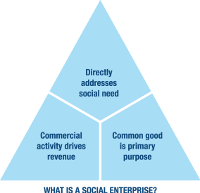
Ask someone what the term social enterprise means to them and you will likely get some interesting responses:
"A business that helps people?"
"A company that has good rapport with their employees?"
"Something to do with the community?"
All great guesses at a term that has recently become more in vogue in the social service sector but is often not fully understood.
Social enterprises are broadly defined as organizations that make money and deliver social benefits while doing so. They may be not-for-profits engaging in for-profit activity to supplement their revenue, or profit-making companies pursuing not-for-profit community or environmental work.
The advocacy group Enterprising Non Profits Canada (ENP) defines a social enterprises as follows: “Social enterprise is a VERB”... yes a verb! I bet you didn't see that coming! Several definitions of a social enterprise from the ENP website help to illustrate the action component of this slightly enigmatic term.
» “Social enterprises are businesses owned by non-profit organizations, that are directly involved in the production and/or selling of goods and services for the blended purpose of generating income and achieving social, cultural, and/or environmental aims. Social enterprises are one more tool for non-profits to use to meet their mission to contribute to healthy communities.”
-Social Enterprise Council of Canada
» “Social enterprises are businesses whose primary purpose is the common good. They use the methods and disciplines of business and the power of the marketplace to advance their social, environmental and human justice agendas.”
-Social Enterprise Alliance, USA
» “A social enterprise is a business that trades for a social and/or environmental purpose. It will have a clear sense of its ‘social mission’: which means it will know what difference it is trying to make, who it aims to help, and how it plans to do it. It will bring in most or all of its income through selling goods or services. And it will also have clear rules about what it does with its profits, reinvesting these to further the ‘social mission.’ ”
-Social Enterprise, UK
The practice and impact of social enterprise is much more widespread in the UK and the USA than in Canada, partially due the different model of government funding for non profit agencies and partially out of the financial need to create core revenue streams by entrepreneurial thinking.
The Sunshine Coast Association for Community Living (SCACL) was introduced to social enterprise by an American in 2005. SCACL’s Executive Director Glen McClughan recalls the meeting:
“My first real exposure to the concept of social enterprise came as a result of meeting Ron Van Royen, an Executive Director from Wisconsin. What he told me had a lasting effect. He told me that the company owned by his agency was a completely self sufficient packaging company that competed and succeeded in the open market place without ever marketing itself as being owned by a non profit society, or that it actively employed people with disabilities”.
This way of thinking spurred Glen and the SCACL board to look outside the box and to do long term social entrepreneurial planning. The agency succeeded and now owns several revenue suites that provide stable low income housing for their clientele, while also generating income that they have re-invested back into their newest social enterprise, a equity partnership with Persephone Brewery Co in Gibsons B.C. This most recent partnership has created seven sustainable employment opportunities for their clients.
Glen is not alone in embracing this new way to do business. In Canada, about one-third of social enterprises were started in just the last two years, according to Social Innovation Generation (SIG), a national project partnered with the MARS Discovery District in Toronto. This statistic points to significant growth in new business efforts to address community and environmental issues. About 20 per cent of social enterprises have been in existence for 20 years or more, long before the term even existed, illustrating that there are proven and sustainable models already in place.
The social enterprise sector will likely continue to expand and succeed in Canada. One thing crucial to this growth is government defining the legal structure for businesses and charities to allow them to form hybrid enterprises. There is currently no legal definition of a social venture or enterprise anywhere in Canada, and this may present a significant impediment to raising capital for some organizations.
SCACL is sold on the value of entrepreneurial thinking and even though making money will never be their cause, revenue-generating projects can help them deliver their mandate.
Social Innovation Generation
www.sigeneration.ca
MARS Discovery District
www.marsdd.com
Enterprising Non Profits BC
www.socialenterprisecanada.ca/en/communities/bc

